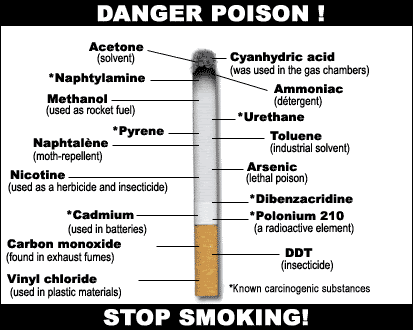
Nicotine
Nicotine is a powerful insecticide and poisonous for the nervous systems. Furthermore, there is enough (50 mg) in four cigarettes to kill a man in just a few minutes if it were injected directly into the bloodstream. Indeed, fatalities have occurred with children after they had swallowed cigarettes or cigarette butts.
When diluted in smoke, nicotine reaches the brain in just seven seconds, it stimulates the brain cells and then blocks the nervous impulse. This is where addiction to tobacco arises. Nicotine also causes accelerated heart rate, but at the same time it leads to contracting and hardening of the arteries: the heart pumps more but receives less blood. The result is twice as many coronary attacks. Nicotine thus also increases the consumption of lipids (which is why it has a weight-loss effect) and induces temporary hyperglycaemia (hence the appetite suppressing effect).
Carbon monoxide (CO)
This is the asphyxiating gas produced by cars, which makes up 1.5% of exhaust fumes. But smokers inhaling cigarette smoke breathe in 3.2% carbon monoxide � and directly from the source.
Oxygen is mostly transported in blood by haemoglobin. When we smoke, however, the carbon monoxide attaches itself to the haemoglobin 203 times more quickly than oxygen does, thereby displacing the oxygen; this in turn asphyxiates the organism. This causes the following cardiovascular complaints: narrowing of the arteries, blood clots, arteritis, gangrene, heart attack, etc. . . . but also a loss of reflexes and visual and mental problems. It takes between six and 24 hours for the carbon monoxide to leave the blood system.
Irritants
These substances paralyse and then destroy the cilia of the bronchial tubes, responsible for filtering and cleaning the lungs. They slow down respiratory output and irritate the mucus membranes, causing coughs, infections and chronic bronchitis.
Tars
As the cilia are blocked (see paragraph above), the tars in the cigarette smoke are deposited and collect on the walls of the respiratory tract and the lungs, and cause them to turn black. So, just because a smoker is not coughing, it doesn't mean that he or she is healthy! And this fact merely serves to pour water on one of the most common and poorest excuses given by smokers. The carcinogenic action of the tars is well known: they are responsible for 95% of lung cancers. It takes two days at least after cessation of smoking for the cilia to start functioning properly again, albeit only gradually. By smoking one packet of cigarettes every day, a smoker is pouring a cupful of these tars into his or her lungs every year (225 grams on average)!
Chemistry of Tobacco Smoke
No less than 4000 irritating, suffocating, dissolving, inflammable, toxic, poisonous, carcinogenic gases and substances and even radioactive compounds (nickel, polonium, plutonium, etc.) have been identified in tobacco smoke. Some of these are listed hereafter: Benzopyrene, dibenzopyrene, benzene, isoprene, toluene (hydorcarbons); naphthylamines; nickel, polonium, plutonium, arsenic, cadmium (metallic constituents); carbon dioxide, methane, ammonia, nitric oxide, nitrogen dioxide,
hydrogen sulphide (gases); methyl alcohol, �thanol, glycerol or glycerine, glycol (alcohols and esters); acetaldehyde, acrolein, acetone (aldehydes and ketones); cyanhydric or prussic acid, carboxyl derivatives (acids); chrysene, pyrrolidine, nicoteine, nicotinine, nicoteline, nornicotine, nitrosamines (alkaloids or bases); cresol (phenols), etc.
 It is fantastic. People of all ages will enjoy it. I highly recommend it if you can find this film in your area.
It is fantastic. People of all ages will enjoy it. I highly recommend it if you can find this film in your area.




